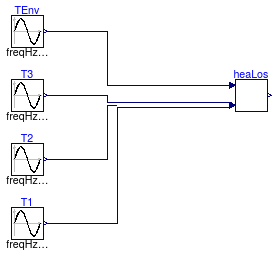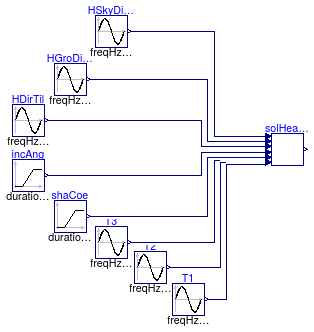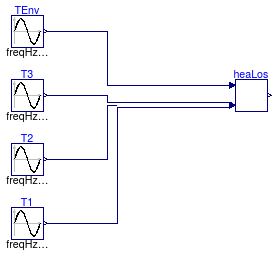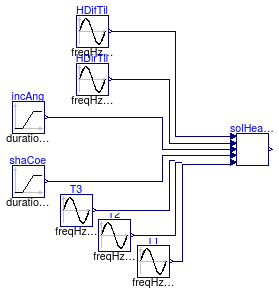Collection of models that illustrate model use and test models
Information
This package contains examples for the use of models that can be found in
Buildings.Fluid.SolarCollectors.BaseClasses.
Extends from Modelica.Icons.ExamplesPackage (Icon for packages containing runnable examples).
Package Content
Example showing the use of ASHRAEHeatLoss

Information
This examples demonstrates the implementation of
Buildings.Fluid.SolarCollectors.BaseClasses.ASHRAEHeatLoss.
Extends from Modelica.Icons.Example (Icon for runnable examples).
Parameters
Modelica definition
model ASHRAEHeatLoss
"Example showing the use of ASHRAEHeatLoss"
extends Modelica.Icons.Example;
parameter Buildings.Fluid.SolarCollectors.Data.GenericSolarCollector per=
Buildings.Fluid.SolarCollectors.Data.GlazedFlatPlate.FP_SolahartKf()
"Performance data";
Modelica.Blocks.Sources.Sine TEnv(
freqHz=0.01,
offset=273.15 + 10,
amplitude=7.5)
"Temperature of the surrounding environment";
Modelica.Blocks.Sources.Sine T1(
freqHz=0.1,
amplitude=15,
offset=273.15 + 10)
"Temperature in the first segment";
Modelica.Blocks.Sources.Sine T2(
freqHz=0.1,
amplitude=15,
offset=273.15 + 15)
"Temperature in the second segment";
Modelica.Blocks.Sources.Sine T3(
freqHz=0.1,
amplitude=15,
offset=273.15 + 20)
"Temperature in the third segment";
Buildings.Fluid.SolarCollectors.BaseClasses.ASHRAEHeatLoss heaLos(
nSeg=3,
m_flow_nominal=per.mperA_flow_nominal*per.A,
redeclare package Medium =
Buildings.Media.Water,
G_nominal=per.G_nominal,
dT_nominal=per.dT_nominal,
A_c=per.A,
y_intercept=per.y_intercept,
slope=per.slope,
cp_default=4186)
"Heat loss model using ASHRAE93 calculations";
equation
connect(TEnv.y, heaLos.TEnv);
connect(T3.y, heaLos.TFlu[3]);
connect(T2.y, heaLos.TFlu[2]);
connect(T1.y, heaLos.TFlu[1]);
end ASHRAEHeatLoss;
Example showing the use of ASHRAESolarGain

Information
This examples demonstrates the implementation of
Buildings.Fluid.SolarCollectors.BaseClasses.ASHRAESolarGain.
Extends from Modelica.Icons.Example (Icon for runnable examples).
Parameters
Modelica definition
model ASHRAESolarGain
"Example showing the use of ASHRAESolarGain"
extends Modelica.Icons.Example;
parameter Buildings.Fluid.SolarCollectors.Data.GenericSolarCollector per=
Buildings.Fluid.SolarCollectors.Data.GlazedFlatPlate.FP_ThermaLiteHS20()
"Performance data";
Buildings.Fluid.SolarCollectors.BaseClasses.ASHRAESolarGain solHeaGai(
nSeg=3,
shaCoe=0,
use_shaCoe_in=true,
A_c=per.A,
y_intercept=per.y_intercept,
B0=per.B0,
B1=per.B1,
redeclare package Medium =
Buildings.Media.Water,
til=0.78539816339745)
"Solar heat gain model using ASHRAE 93 calculations";
Modelica.Blocks.Sources.Sine HGroDifTil(
amplitude=50,
freqHz=4/86400,
offset=100)
"Diffuse radiation from the ground, tilted surface";
Modelica.Blocks.Sources.Ramp incAng(duration=86400, height=60*(2*Modelica.Constants.pi
/360))
"Incidence angle";
Modelica.Blocks.Sources.Sine HDirTil(
offset=400,
amplitude=300,
freqHz=2/86400)
"Direct beam radiation, tilted surface";
Modelica.Blocks.Sources.Sine HSkyDifTil(
freqHz=1/86400,
amplitude=100,
offset=100)
"Diffuse radiation, tilted surface";
Modelica.Blocks.Sources.Ramp shaCoe(
height=-1,
duration=86400,
offset=1)
"Shading coefficient";
Modelica.Blocks.Sources.Sine T3(
freqHz=2/86400,
amplitude=50,
offset=273.15 + 110);
Modelica.Blocks.Sources.Sine T2(
freqHz=2/86400,
amplitude=50,
offset=273.15 + 100);
Modelica.Blocks.Sources.Sine T1(
freqHz=2/86400,
amplitude=50,
offset=273.15 + 90);
equation
connect(HGroDifTil.y, solHeaGai.HGroDifTil);
connect(shaCoe.y, solHeaGai.shaCoe_in);
connect(incAng.y, solHeaGai.incAng);
connect(HDirTil.y, solHeaGai.HDirTil);
connect(HSkyDifTil.y, solHeaGai.HSkyDifTil);
connect(T3.y, solHeaGai.TFlu[3]);
connect(T2.y, solHeaGai.TFlu[2]);
connect(T1.y, solHeaGai.TFlu[1]);
end ASHRAESolarGain;
Example showing the use of EN12975HeatLoss

Information
This examples demonstrates the implementation of
Buildings.Fluid.SolarCollectors.BaseClasses.EN12975HeatLoss.
Extends from Modelica.Icons.Example (Icon for runnable examples).
Parameters
Modelica definition
model EN12975HeatLoss
"Example showing the use of EN12975HeatLoss"
extends Modelica.Icons.Example;
parameter Buildings.Fluid.SolarCollectors.Data.GenericSolarCollector per=
Buildings.Fluid.SolarCollectors.Data.Concentrating.C_VerificationModel()
"Performance data";
Modelica.Blocks.Sources.Sine TEnv(
freqHz=0.01,
offset=273.15 + 10,
amplitude=15)
"Temperature of the surrounding environment";
Modelica.Blocks.Sources.Sine T1(
amplitude=15,
freqHz=0.1,
offset=273.15 + 10)
"Temperature of the first segment";
Modelica.Blocks.Sources.Sine T2(
freqHz=0.1,
amplitude=15,
offset=273.15 + 15)
"Temperature of the second segment";
Modelica.Blocks.Sources.Sine T3(
freqHz=0.1,
amplitude=15,
offset=273.15 + 20)
"Temperature of the third segment";
Buildings.Fluid.SolarCollectors.BaseClasses.EN12975HeatLoss heaLos(
nSeg=3,
redeclare package Medium =
Buildings.Media.Water,
C1=per.C1,
C2=per.C2,
m_flow_nominal=per.mperA_flow_nominal*per.A,
G_nominal=per.G_nominal,
dT_nominal=per.dT_nominal,
A_c=per.A,
y_intercept=per.y_intercept,
cp_default=4186)
"Heat loss model using EN12975 calculations";
equation
connect(TEnv.y, heaLos.TEnv);
connect(T3.y, heaLos.TFlu[3]);
connect(T2.y, heaLos.TFlu[2]);
connect(T1.y, heaLos.TFlu[1]);
end EN12975HeatLoss;
Example showing the use of EN12975SolarGain

Information
This examples demonstrates the implementation of
Buildings.Fluid.SolarCollectors.BaseClasses.EN12975SolarGain.
Extends from Modelica.Icons.Example (Icon for runnable examples).
Parameters
Modelica definition
model EN12975SolarGain
"Example showing the use of EN12975SolarGain"
extends Modelica.Icons.Example;
parameter Buildings.Fluid.SolarCollectors.Data.GenericSolarCollector per=
Buildings.Fluid.SolarCollectors.Data.Concentrating.C_VerificationModel()
"Performance data";
Buildings.Fluid.SolarCollectors.BaseClasses.EN12975SolarGain solHeaGai(
B0=per.B0,
B1=per.B1,
y_intercept=per.y_intercept,
nSeg=3,
A_c=per.A,
iamDiff=per.IAMDiff,
shaCoe=0,
use_shaCoe_in=true,
redeclare package Medium =
Buildings.Media.Water)
"Solar heat gain model using EN12975 calculations";
Modelica.Blocks.Sources.Ramp incAng(duration=86400,
height=60*(2*Modelica.Constants.pi/360))
"Incidence angle";
Modelica.Blocks.Sources.Sine HDirTil(
offset=400,
amplitude=300,
freqHz=2/86400)
"Direct beam radiation, tilted surface";
Modelica.Blocks.Sources.Sine HDifTil(
amplitude=200,
freqHz=1/86400,
offset=300)
"Diffuse radiation, tilted surface";
Modelica.Blocks.Sources.Ramp shaCoe(
duration=86400,
offset=1,
height=-1)
"Shading coefficient";
Modelica.Blocks.Sources.Sine T3(
freqHz=2/86400,
amplitude=50,
offset=273.15 + 110);
Modelica.Blocks.Sources.Sine T2(
freqHz=2/86400,
amplitude=50,
offset=273.15 + 100);
Modelica.Blocks.Sources.Sine T1(
freqHz=2/86400,
amplitude=50,
offset=273.15 + 90);
equation
connect(incAng.y, solHeaGai.incAng);
connect(shaCoe.y, solHeaGai.shaCoe_in);
connect(HDirTil.y, solHeaGai.HDirTil);
connect(HDifTil.y, solHeaGai.HSkyDifTil);
connect(T3.y, solHeaGai.TFlu[3]);
connect(T2.y, solHeaGai.TFlu[2]);
connect(T1.y, solHeaGai.TFlu[1]);
end EN12975SolarGain;
Automatically generated Mon Jul 13 14:26:04 2015.


 Buildings.Fluid.SolarCollectors.BaseClasses.Examples.ASHRAEHeatLoss
Buildings.Fluid.SolarCollectors.BaseClasses.Examples.ASHRAEHeatLoss
 Buildings.Fluid.SolarCollectors.BaseClasses.Examples.ASHRAESolarGain
Buildings.Fluid.SolarCollectors.BaseClasses.Examples.ASHRAESolarGain
 Buildings.Fluid.SolarCollectors.BaseClasses.Examples.EN12975HeatLoss
Buildings.Fluid.SolarCollectors.BaseClasses.Examples.EN12975HeatLoss
 Buildings.Fluid.SolarCollectors.BaseClasses.Examples.EN12975SolarGain
Buildings.Fluid.SolarCollectors.BaseClasses.Examples.EN12975SolarGain